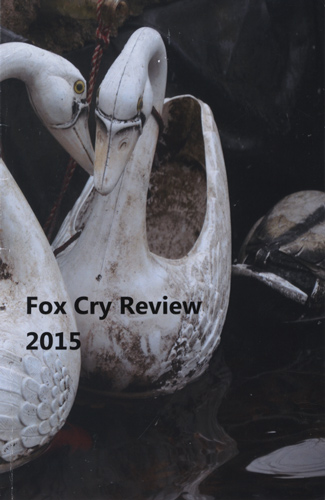Fox Cry Review – 2015
If there’s one thing I appreciate, it’s a thin journal. Lightweight, no long-term commitment intimidation, something us not-so-fast-readers can truly read in one sitting. Add to that over a dozen names on the table of contents, and there’s no doubt the variety will add some interesting diversity as a return on the short-term time investment. This is an apt descriptor to introduce Fox Cry Review published out of University of Wisconsin – Fox Valley. If there’s one thing I appreciate, it’s a thin journal. Lightweight, no long-term commitment intimidation, something us not-so-fast-readers can truly read in one sitting. Add to that over a dozen names on the table of contents, and there’s no doubt the variety will add some interesting diversity as a return on the short-term time investment. This is an apt descriptor to introduce Fox Cry Review published out of University of Wisconsin – Fox Valley.
Editorial preferences are clear in that the three fiction pieces offer well-crafted, detailed characters. The narrator in “Patience” is a mason who takes on his boss’s nephew, Jeff, in an effort to teach the kid a lesson that hard labor sucks, and that he’ll be doing it his whole life—just like the narrator—if he doesn’t get his act together. Author Nicholas Benca hooks readers with reverse storytelling. It begins: “I know it wasn’t Jeff’s fault. Al’s really the one to blame. Well, Al and me because I was the one who took it out on the kid. If I trace it back, it started years ago . . .” The pacing is measured, with minor tensions that surface and ripple out, keeping the story steady until the end, where Benca delivers a concluding scene that made me want to go back and re-read the beginning. A nice, tight loopback.
Nathan Graziano’s story “A Decent Man” hook isn’t one that would have kept me reading: “It is one p.m., the day before his thirty-third birthday, and Officer Brad Herling is getting head from a high school girl while thinking about something his wife said to him at breakfast.” With so much “bad cop” narrative running in the daily news, I was ready to shut this character (and story) down. Surprisingly, Graziano doesn’t attempt to salvage Herling’s life for him, but rather lets the story unfold in the dismal spiral Herling spins for himself through his repeated “reckless decisions.” The concluding scene on the surface might read like a punchline ending, but it’s not. It leaves the finality open to interpretation, and perhaps some good argument.
“Larry’s Last Day” by Brian Rowe embodies my favorite kind of character story—about a social misfit. While the characters are well-developed with concisely intricate details condensed into just over two pages, I was a confused by the setting—did Larry work for a video rental store, a convenience store, some business for which video was a sideline? Not sure. But I know Larry loves his VHS, DVD is moving in, and Larry’s love of tapes makes him just as expendable as the spools of Mylar. Poor Larry. Poor odd and a bit creepy Larry, who made me laugh out loud when “he took out the shiny DVD and threw it at Bill, like a Frisbee. It smacked his boss on the forehead and dropped to the ground.” Thus, Larry’s last day.
While the stories don’t offer up much diversity (which even in three contributions, I think they could), the poetry in Fox Valley Review makes up the remainder of the fourteen featured writers, delivering the variety. At the top of my list is Marilyn Fleming’s “Solitary Leaf,” a haiku sequence for which each of the seven stanzas could stand alone, but combined, create a complete, unified image and feeling. Fleming follows up “her tongue / on the lip of the cup / —wet red clay” with “a medicine man / dancing bedside / hollow hoot of an owl” to open, then continues drawing the thread through the sequence.
Several poems use snap chaotic sensory imagery to create a kind of stream of existence. Like the opening lines of “Lakeview Drive” by Beau Boudreaux: “Maybe not the woman / but the music sends me— // electric streetcars.” And “Haste to Waste” by Georgia Ressmeyer, describing Monday morning trash day with a playful form and dangerously dark imagery:
. . . Monday’s arrival in bursts
of gunned engines
smashed trash
shrieks of
grinding of teeth on glass
to the jangle of nerves
clatter of thoughts crushed
by the steel jaws of
never enough—
Most of the poems in this collection warrant a second read at a second sitting for greater appreciation, but two final mentions, “I Meant to Write a Poem Today” by Sarah Gilbert and “We are Welcome Here” by Jeffrey Johannes grab hold on first read. Gilbert’s offers a comforting sense of settling in, ending (spoiler alert) on the single word “home,” the tone of which resonates deeply. Whereas Johannes’s more stark look at (could be Walmart) superstore patrons feels like mild repulsive disconnect, but draws us all in by the end “because / we are all welcome here to shop / for what we want or what we need.”
Given its over forty-year history of publishing and strong editorial sensibilities for concisely crafted works and range of style, my greatest criticism for Fox Cry Review is that it’s too slim. I would have been happy to make a longer commitment for my at-one-sitting reading with more content of the quality they are able to select. But I guess that’s also up to you writers to make sure Fox Cry Review has plenty of great submissions from which to choose.
[www.uwfox.uwc.edu/academics/depts/eng/links]





